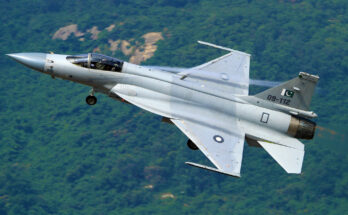
Friction between French, German, and Spanish partners on the Future Combat Air System (FCAS) program is escalating. Germany and Spain are growing frustrated with France’s primary contractor, Dassault, which is seeking a disproportionate share of the project’s work, leading to concerns that the program may be at a crossroads.
Launched by France and Germany in 2017, with Spain joining in 2019, the FCAS program aims to replace the nations’ current fighter aircraft by 2040. The plan is to develop a sixth-generation New Generation Fighter (NGF) to operate alongside autonomous Remote Carriers (RC), all linked by a cloud-based datalink.
The program has already faced delays due to disagreements among the contractors. The latest point of contention is the industrial workshare, with rumors circulating that Dassault is seeking up to 80% of the work. The CEO of Dassault, Eric Trappier, has publicly argued that his company’s deep expertise in fighter design, built over decades, necessitates greater control and decision-making authority for national security reasons. This stance has put him at odds with the German and Spanish partners, as well as Airbus, which is a major contractor on the project.
The next few months will be crucial as a diplomatic “game of who blinks first” unfolds. Defense ministers are scheduled to meet in October to try and resolve the workshare dispute and reach an agreement on Phase 2 of the program (which would see the aircraft demonstrator take first flight in 2029).
Germany, in what may be a negotiating tactic, is reportedly considering other partners like Sweden or even the UK, though the latter seems unlikely given the UK’s commitment to its own Global Combat Air Program (GCAP) with Japan and Italy. Sweden could be a fallback possibility because its industrial leader, Saab, is still in the early stages of developing its own next-generation fighter concept.
If negotiations fail, Germany and Spain could potentially join the GCAP, but for now this appears a long shot.
France, meanwhile, has a history of walking away from multinational fighter programs, as it did with the Panavia Tornado and the Eurofighter Typhoon, preferring to pursue its own national solutions like the Mirage and the Rafale.
Given the current tensions, history may be on the verge of repeating itself, despite France’s stated desire for greater European defense cooperation. Joint defense programs, especially those involving “crown jewels” of military technology like advanced fighter design, are notoriously complex and often a reflection of national interests and industrial sovereignty. As such France may once again spurn a multinational combat aircraft initiative in favor of a national solution.
Dan Darling is Forecast International’s director of military and defense markets. In this role, Dan oversees a team of analysts tasked with covering everything from budgeting to weapons systems to defense electronics and military aerospace. Additionally, for over 17 years Dan has, at various times, authored the International Military Markets reports for Europe, Eurasia, the Middle East and the Asia-Pacific region.
Dan's work has been cited in Defense News, Real Clear Defense, Asian Military Review, Al Jazeera, and Financial Express, among others, and he has also contributed commentary to The Diplomat, The National Interest and World Politics Review. He has been quoted in Arabian Business, the Financial Times, Flight International, The New York Times, Bloomberg and National Defense Magazine.
In addition, Dan has made guest appearances on the online radio show Midrats and on The Media Line, as well as The Red Line Podcast, plus media appearances on France 24 and World Is One News (WION).
- Daniel Darling
- Daniel Darling
- Daniel Darling
- Daniel Darling
- Daniel Darling
- Daniel Darling
- Daniel Darling
- Daniel Darling
- Daniel Darling
- Daniel Darling
- Daniel Darling
- Daniel Darling
- Daniel Darling
- Daniel Darling
- Daniel Darling
- Daniel Darling
- Daniel Darling
- Daniel Darling
- Daniel Darling
- Daniel Darling
- Daniel Darling
- Daniel Darling
- Daniel Darling
- Daniel Darling
- Daniel Darling
- Daniel Darling
- Daniel Darling
- Daniel Darling
- Daniel Darling
- Daniel Darling
- Daniel Darling
- Daniel Darling
- Daniel Darling
- Daniel Darling
- Daniel Darling
- Daniel Darling
- Daniel Darling
- Daniel Darling
- Daniel Darling
- Daniel Darling
- Daniel Darling
- Daniel Darling
- Daniel Darling
- Daniel Darling
- Daniel Darling
- Daniel Darling
- Daniel Darling
- Daniel Darling
- Daniel Darling
- Daniel Darling
- Daniel Darling
- Daniel Darling
- Daniel Darling
- Daniel Darling
- Daniel Darling
- Daniel Darling
- Daniel Darling
- Daniel Darling
- Daniel Darling
- Daniel Darling
- Daniel Darling
- Daniel Darling
- Daniel Darling
- Daniel Darling
- Daniel Darling
- Daniel Darling
- Daniel Darling
- Daniel Darling
- Daniel Darling
- Daniel Darling
- Daniel Darling
- Daniel Darling
- Daniel Darling
- Daniel Darling
- Daniel Darling
- Daniel Darling
- Daniel Darling
- Daniel Darling
- Daniel Darling
- Daniel Darling
- Daniel Darling
- Daniel Darling
- Daniel Darling
- Daniel Darling
- Daniel Darling
- Daniel Darling
- Daniel Darling
- Daniel Darling
- Daniel Darling
- Daniel Darling
- Daniel Darling
- Daniel Darling
- Daniel Darling
- Daniel Darling
- Daniel Darling
- Daniel Darling
- Daniel Darling
- Daniel Darling
- Daniel Darling
- Daniel Darling
- Daniel Darling
- Daniel Darling
- Daniel Darling
- Daniel Darling
- Daniel Darling
- Daniel Darling
- Daniel Darling
- Daniel Darling
- Daniel Darling




